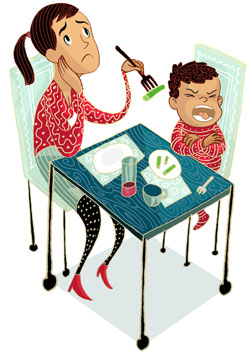
The Yale research team recommends this hands-off approach when the traditional model of modeling and rewarding desired behaviors (like eating veggies and picking up toys) has failed. The idea is that when parents seek those desired behaviors and the kids refuse to comply, parents become desperate, which pushes kids to resist further. The child feels pressure and so she reacts and rebels and becomes defiant. It is human nature to reject what we feel is forced upon us, even (or maybe especially) for kids. So, by failing to encourage or praise the child, the parent removes the sense of pressure against which the child is rebelling.
What do you think? Have any of you tried this approach, and what was the result?
I have certainly seen this phenomenon in the families I work with: the parent cajoles, pushes, encourages, begs, and the child...absolutely resists or even tantrums and misbehaves. I have told parents that children, like dogs and bees, can smell your fear--the fear that you have lost all control over your child--and they react in a very organic way. Copping the attitude that you don't care whether or not your kid eats his broccoli is the first step towards him actually choosing to eat the broccoli. Acting like you don't care sounds easy. But when you think about NOT praising your child or even commenting when he FINALLY remembers to take off his muddy shoes before tracking across the white carpet, or initiates doing her own homework after school for the first time ever feels unnatural and even cruel to many parents. -Kate Altman, M.S.
ReplyDelete